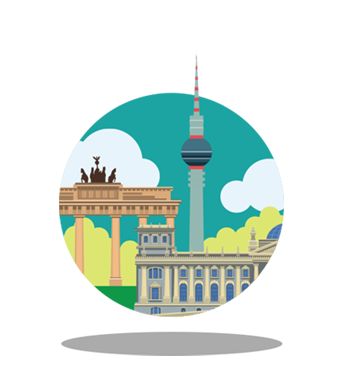COVID-19 caused many German consumers to look inwards. People developed a preference for local products and there was an increased reliance on services such as weekly markets.
The importance of the emotional bond has also gone up since the arrival of COVID-19. German consumers have come to expect a more personalized experience with retailers, and indeed the pillar of Personalization is the most important for driving loyalty in Germany. Often, when consumers visit stores, they expect to receive individualized attention and tailored advice, so that they can be guided towards making the best purchase.
The Non-grocery retail sector is leading the way in this regard. But Personalization isn't always the customer's priority. Usually, it depends on the touchpoint. If it's an online purchase, the consumer focuses more on the pillar of Time and Effort, and there is a high expectation that these digital experiences will be seamless and stress-free.
This is certainly a pillar that the hardware retailer Hornbach has mastered, and the brand has seen a significant rise in the German rankings since 2019. With its wide range of delivery options, customers can pick the fastest and most convenient solutions, giving people the choice to have products delivered to their nearest stores, or brought directly to their doorsteps. Similarly, the insurance company HUK-COBURG scores highly for Time and Effort, and the brand ranks at number three in 2020. Its online personal service area gives customers the opportunity to manage their own insurance policies, 'taking the wheel' and side-stepping the arduous, cross-departmental journeys that can sometimes be found in the less finely-tuned customer experiences.
But Personalization is also key to HUKCOBURG's strategy. The brand prioritizes individualized care and attention and wants its customers to feel 'looked after.' Indeed, reliability is part of the organization's mission statement, and it says that it views customers as equal partners in the business, almost as if they were part of the HUK-COBURG family.1 This community feeling is also in evidence at Germany's second highest-scoring brand, the e-commerce retailer Zooplus, which specializes in pet-related products.
On its website, there is an on-going dialogue between the brand and consumers via the Zooplus blog, and the retailer also hosts a forum where pet owners can exchange ideas and knowledge. As with HUK-COBURG, there is a sense of people 'all being in it together,' and it's unsurprising that Zooplus' customers are some of the most loyal in Germany.
"Do you love your pets more than anything?" the brand asks on its website. "For us there is nothing more important than fulfilling this wish for you and your beloved pet— and has been for almost 20 years!"2
Zooplus also runs its own loyalty program as a way of 'giving back' to consumers. With each purchase, participants accrue zoo points which can be exchanged for products or discounts in the Zooplus shop. There is also an option for people to donate these points to animal welfare charities. It should also be noted that Zooplus scores particularly highly in the pillar of Time and Effort, with customers praising the speed and efficiency of its online store.
Taking first place in the rankings in Germany is the optician Fielmann, which is perhaps one of the most customer-centric in the country. Fielmann places a strong emphasis on the education and training of its employees, ensuring that they are fully equipped to meet a wide range of customer needs with minimal hassle.
"'You are the customer' is the guiding principle of our corporate philosophy," the brand says on its website. "Our employees find the individual solution to the vision problem for each customer, always at a fair price."3
Over the last few years, Fielmann has also been improving its digital capabilities and recently launched an online shop, recognizing the omnichannel needs of the customer of 2020. And despite being a relative newcomer to this channel, Fielmann has already created an efficient online presence, with its strongest pillar being Time and Effort. For example, when shopping for glasses, customers can select their preferred frames and then use the in-built map to find their nearest store, and book an appointment to have them fitted. Looking ahead, German brands will have to reach this level of digitization if they're to remain competitive. The online platforms have grown in importance since the arrival of COVID, and this is a trend that looks set to continue. But customers also want to have the choice, and for brands to be available physically or online depending on their needs.
“Most German brands are continuously improving the customer experience. Top performers know how to create seamlessly connected digital and personal experiences as required by the customer and suitable for their product or service. This enables these organizations to rapidly respond to changing customer expectations and constantly deliver outstanding experiences." ”
Tom Lurtz
Partner & Head of Customer Advisory
KPMG in Germany
Leading CX brands in Germany
Fielmann

Zooplus

HUKCOBURG

LEGO

Nike

Budnikowsky

Flaconi

Reformhaus

Techniker Krankenkasse

DM


